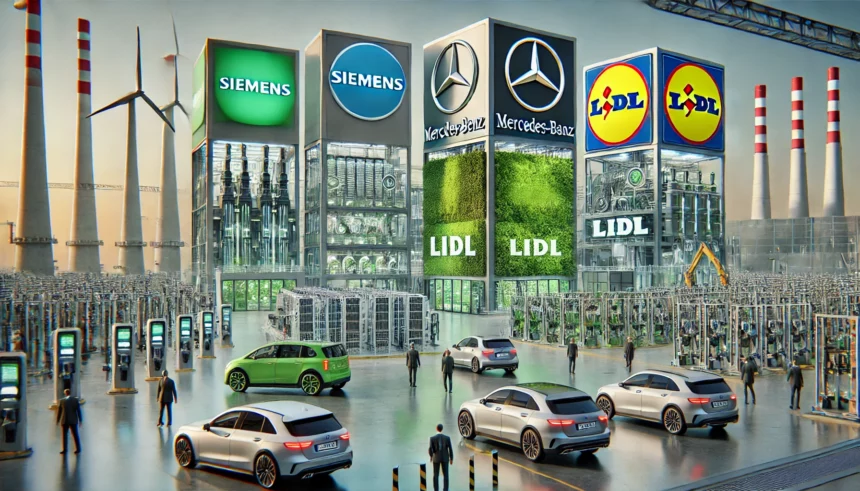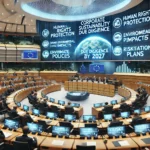Introduction
In recent years, environmental crises have underscored the urgent need for effective action. Businesses play a significant role in driving sustainable change, especially those with large carbon footprints. Germany, known for its industrial strength, is home to many leading companies that are paving the way toward sustainability. Let’s dive into the carbon footprints and reporting practices of some top German companies.
Germany’s Path to Sustainability
Environmental Leadership
Germany has long been at the forefront of environmental policy, committed to the Paris Agreement’s climate goals. The European Union’s Corporate Sustainability Reporting Directive (CSRD) is a significant driver in shaping these policies, mandating comprehensive sustainability disclosures. This directive ensures companies are more transparent and accountable for their environmental impact.
Regulatory Influence
The CSRD, effective from January 2023, expands the scope of sustainability reporting. Companies must now disclose detailed information on Environmental, Social, and Governance (ESG) activities, focusing on the principle of double materiality. This means reporting both the impact of their operations on the environment and the financial risks and opportunities associated with sustainability issues.
Corporate Sustainability Trends in Germany
Rising Awareness
Recent data shows over 70% of German companies are aware of their carbon footprint, and about 54% have set concrete goals to reduce emissions. However, less than 45% align their goals with the Paris Agreement, indicating room for more rigorous action.
Integration of Sustainability
German companies are integrating sustainability into their core strategies, driven by regulations and public demand. Dedicated sustainability teams and executive-level environmental goals are now common.
Case Studies of Leading German Companies
Siemens AG
Sustainability Initiatives
- Energy Efficiency: Siemens invested €100 million in energy efficiency improvements, saving €20 million annually in energy costs.
- Renewable Energy: 77% of Siemens’ electricity consumption comes from renewable sources.
- Innovative Technologies: Siemens’ Environmental Portfolio helps customers reduce CO2 emissions by 428 million metric tonnes.
Progress and Future Targets Siemens aims to achieve net-zero emissions by 2030, focusing on electric vehicles, renewable energy, and supply chain emissions reduction. The company provides transparent updates through detailed annual reports.
Mercedes-Benz Group
Sustainability Efforts
- Production Sites: Achieved net carbon neutrality at vehicle production sites in 2022.
- Supply Chain: Ensures high environmental and ethical standards for suppliers, aiming for zero CO2 emissions by 2039.
- Electric Vehicles: Developing a range of electric and hybrid vehicles to reduce emissions.
Innovations Mercedes-Benz uses sustainable materials, including recycled microfiber fleece, and plans to operate all production plants on renewable energy by 2030.
Lidl
Sustainability Reporting Practices Lidl’s sustainability reports, adhering to the Global Reporting Initiative standard, cover areas like energy efficiency, animal welfare, and recycling.
Key Initiatives
- Energy Efficiency: Reduced Scope 2 emissions by 97.4% through green electricity.
- Animal Welfare: Increased higher welfare standards for poultry.
- Recycling: Extensive programs to reduce waste and promote a circular economy.
Achievements and Goals Lidl won the Oxfam Supermarket Check 2022 for human rights and forest conservation. The company aims to further enhance sustainability efforts, keeping stakeholders informed through transparent reporting.
The Future of Corporate Sustainability in Germany
Advanced Technologies
Companies will use AI and blockchain for better sustainability tracking and reporting. The shift towards a circular economy, focusing on waste reduction and recycling, will gain momentum.
Stringent Regulations
Future regulations will likely become stricter, pushing companies to adopt rigorous sustainability practices. Compliance will be crucial for legal adherence and maintaining stakeholder trust.
Collaboration
Sustainable development requires collaboration between government, businesses, and the public. Supportive policies, integrated business strategies, and public engagement are key to driving demand for sustainable practices.
Conclusion
The case studies of Siemens, Mercedes-Benz, and Lidl show that leading German companies are committed to reducing their carbon footprints and transparently reporting their progress. This transparency fosters trust and accountability, driving the corporate sustainability agenda forward.
By embracing innovation, aligning with global regulations, and fostering collaboration, German companies can significantly contribute to global sustainability goals and set a high standard for corporate responsibility.
















